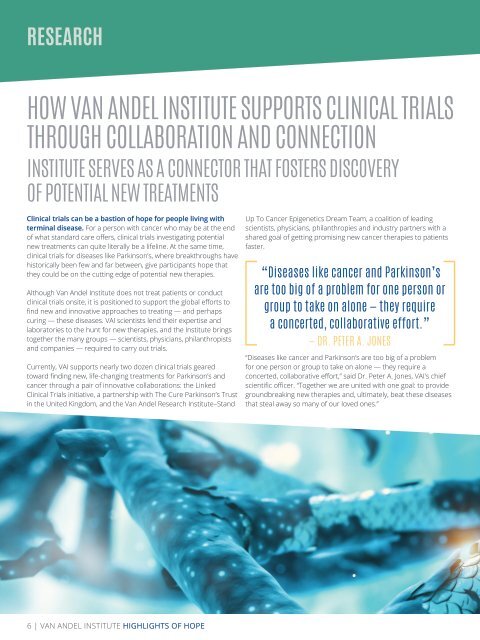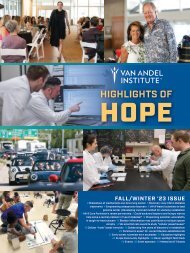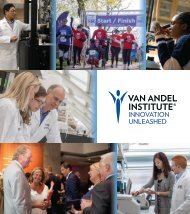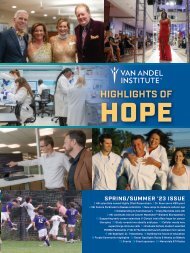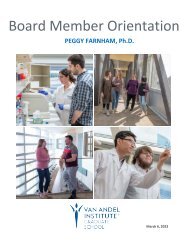2019 Highlights of Hope: Fall/Winter
Create successful ePaper yourself
Turn your PDF publications into a flip-book with our unique Google optimized e-Paper software.
RESEARCH<br />
HOW VAN ANDEL INSTITUTE SUPPORTS CLINICAL TRIALS<br />
THROUGH COLLABORATION AND CONNECTION<br />
INSTITUTE SERVES AS A CONNECTOR THAT FOSTERS DISCOVERY<br />
OF POTENTIAL NEW TREATMENTS<br />
Clinical trials can be a bastion <strong>of</strong> hope for people living with<br />
terminal disease. For a person with cancer who may be at the end<br />
<strong>of</strong> what standard care <strong>of</strong>fers, clinical trials investigating potential<br />
new treatments can quite literally be a lifeline. At the same time,<br />
clinical trials for diseases like Parkinson’s, where breakthroughs have<br />
historically been few and far between, give participants hope that<br />
they could be on the cutting edge <strong>of</strong> potential new therapies.<br />
Although Van Andel Institute does not treat patients or conduct<br />
clinical trials onsite, it is positioned to support the global efforts to<br />
find new and innovative approaches to treating — and perhaps<br />
curing — these diseases. VAI scientists lend their expertise and<br />
laboratories to the hunt for new therapies, and the Institute brings<br />
together the many groups — scientists, physicians, philanthropists<br />
and companies — required to carry out trials.<br />
Currently, VAI supports nearly two dozen clinical trials geared<br />
toward finding new, life-changing treatments for Parkinson’s and<br />
cancer through a pair <strong>of</strong> innovative collaborations: the Linked<br />
Clinical Trials initiative, a partnership with The Cure Parkinson’s Trust<br />
in the United Kingdom, and the Van Andel Research Institute–Stand<br />
Up To Cancer Epigenetics Dream Team, a coalition <strong>of</strong> leading<br />
scientists, physicians, philanthropies and industry partners with a<br />
shared goal <strong>of</strong> getting promising new cancer therapies to patients<br />
faster.<br />
“Diseases like cancer and Parkinson’s<br />
are too big <strong>of</strong> a problem for one person or<br />
group to take on alone — they require<br />
a concerted, collaborative effort.”<br />
— DR. PETER A. JONES<br />
“Diseases like cancer and Parkinson’s are too big <strong>of</strong> a problem<br />
for one person or group to take on alone — they require a<br />
concerted, collaborative effort,” said Dr. Peter A. Jones, VAI's chief<br />
scientific <strong>of</strong>ficer. “Together we are united with one goal: to provide<br />
groundbreaking new therapies and, ultimately, beat these diseases<br />
that steal away so many <strong>of</strong> our loved ones.”<br />
Clinical trials ongoing<br />
Among the clinical trials currently underway through the VARI–<br />
SU2C Epigenetics Dream Team are a slate <strong>of</strong> combination therapies<br />
that pair epigenetic drugs, which work by regulating when and<br />
to what extent the instructions encoded in our genes are carried<br />
out, with other medications such as those that boost the immune<br />
system.<br />
These potentially potent combinations are now being investigated<br />
in lung cancer, bladder cancer and blood cancers, among others,<br />
and may better fight these tough-to-treat diseases.<br />
“We’re trying to advance the standard <strong>of</strong> care by having new<br />
treatment options in the arsenal that an oncologist or a<br />
hematologist could have to fight patients’ cancers,” said Dan<br />
Rogers, the Institute’s clinical research manager. “From a patient<br />
perspective, clinical trials <strong>of</strong>fer treatments that could possibly<br />
extend their life and give them good quality <strong>of</strong> life.”<br />
Progress can’t wait<br />
According to some estimates, it can take over a decade and more<br />
than a billion dollars to shepherd a new drug through the research,<br />
development and clinical trial phases before pharmaceutical<br />
companies can obtain federal approval to go to market. Still,<br />
despite the hard work poured into developing new therapies, more<br />
than 9 in 10 new drugs fail in development, while the diseases they<br />
are meant to treat continue claiming lives.<br />
That is where the Institute’s Linked Clinical Trials collaboration<br />
with The Cure Parkinson’s Trust helps by exploring whether drugs<br />
already on the market could be effective treatments for diseases<br />
they weren’t originally designed to treat.<br />
“Through LCT, scientists are looking at what drugs are already<br />
approved by the Food and Drug Administration to identify<br />
potential avenues for new treatments,” Rogers said. “This<br />
approach, coupled with work being done to discover new drugs,<br />
helps us have a broad impact in clinical research across the<br />
country and world.”<br />
For instance, clinical trials are ongoing to explore whether a<br />
number <strong>of</strong> drugs intended for diabetes treatment — including<br />
exenatide, lixisenatide and liraglutide — could also be treatments<br />
for people with Parkinson’s. That’s because the complex<br />
molecular mechanisms that give rise to both diseases overlap,<br />
meaning a drug designed to fix a problem in diabetes may also<br />
help fix a similar issue in Parkinson’s.<br />
A tailored approach<br />
A strong research portfolio and dedicated team <strong>of</strong> scientists<br />
positions the Institute to pursue the breakthroughs that benefit<br />
humanity. The Institute’s multipronged approach to clinical trials<br />
— both uncovering new drugs and seeking to repurpose old<br />
ones — reflects this.<br />
“By working with a collective <strong>of</strong> investigators and institutions,<br />
we leverage our scientific strength to have an impact,” Rogers<br />
said. “We work boldly to advance ideas that could change the<br />
standard <strong>of</strong> care for generations.”<br />
For more information on these clinical trials,<br />
visit vai.org/clinical-trials.<br />
DISEASES BEING<br />
TARGETED BY CLINICAL TRIALS<br />
Parkinson's disease<br />
Metastatic colorectal cancer<br />
Acute myeloid leukemia<br />
Myelodysplastic syndrome (MDS), acute myeloid<br />
leukemia (AML), Myelodysplastic syndrome (MDS) and<br />
chronic myelomonocytic leukemia (CMML)<br />
Small cell lung cancer<br />
Non-small cell lung cancer<br />
Bladder (urothelial) cancer<br />
Liver, pancreatic, bile duct and gallbladder cancers<br />
Breast cancers, triple negative or hormone resistant/<br />
HER2-negative metastatic breast cancer<br />
6 | VAN ANDEL INSTITUTE HIGHLIGHTS OF HOPE<br />
VAN ANDEL INSTITUTE HIGHLIGHTS OF HOPE | 7


